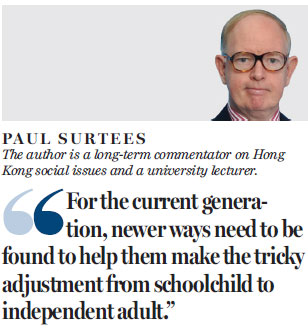Hong Kong youths should embrace gap year breaks to enrich themselves
Updated: 2016-08-02 07:54
By Paul Surtees(HK Edition)
|
|||||||||
It is counter-intuitive, ironic, but true to say that taking a goodly break can lead to better performance across a range of endeavors. Those endeavors include academic pursuits. I write of the fairly recent phenomenon - now widely embraced by school-leavers in many Western countries - of taking a year or two off from academic work between leaving high school and beginning university life called a gap year. This option has much to recommend itself to Hong Kong school-leavers as well.
When we are 17 or 18, few of us know for certain what we want to do in life, what career to work toward, or even in many cases have a clear idea of which subject we should major in at university. By taking a year off from studies at that stage, many young people can become more mature, more self-reliant, and eventually more focused on what they really do want to study after school ends and college begins - or even, for some, to decide that further study is not for them. Their break, away from the enclosed world of academia, can help them to put things in better perspective, as they will have experienced things during that year off (if properly arranged) that open their eyes and minds to the real world.

Let it be recognized, however, that many bright would-be undergraduates in Hong Kong come from financially disadvantaged homes. Their parents may not themselves have completed a university education, and the family's focus may perforce be getting the school-leaver to earn a living, just as soon as can be managed. To those poorer youngsters, going overseas on an exchange scheme arrangement - unless fully sponsored to do so - or acting as an unpaid intern or voluntary worker are not realistic options. However, even under those constraints, the school-leaver could readily take paid employment for a year, thus earning at least something toward covering his maintenance costs when he attends university later. That year of work at a formative age will certainly help him to mature and learn more about himself, while helping to develop his character.
For others, not so constrained by pressing economic needs, there are many choices. Earlier generations of younger people over the world went through tough but character-building times in completing their national service, in wars, and here in struggling as refugees to make new lives for themselves upon coming to Hong Kong. Today's Hong Kong youngsters are not called up to do military service, do not live in squatter homes, and thankfully are unlikely to have to go to war. All those testing experiences helped to toughen the character of their grandparents or parents. For the current generation, newer ways need to be found to help them make the tricky adjustment from schoolchild to independent adult.
The well-known mollycoddling syndrome and the helicopter parenting are more likely to do young people more harm than good primarily by depriving them of the ordinary challenges of life. If the youngster's gap year can take him away from this too-embracing parental security net, and force him to learn to look after himself, then that of itself would be a good reason to do it. That, of course, is to be most easily achieved by living away from the too-comfortable family nest. Numerous international exchange schemes available to Hong Kong young people give them the chance to live, work or study for a year in many places overseas. There are, as yet, far more such places available than there is taken up by our Hong Kong youths. So the choice is wide.
Unfortunately, with the popularity of gap years in Western countries, an unhealthy phenomenon has sprung up there - the "gap year package tour" offered by many organizations. Under these arrangements, the parents fork out goodly sums for their offspring to be flown overseas - where they often live exclusively with other gap year students from their own homeland. Accommodation, leisure travel, with a bit of voluntary work thrown in, are all set up and provided by the organization. While it is very understandable that parents want their offspring to be safe during their gap years, providing such a ready-made comprehensive package negates the whole point of the exercise - that is, for the youngster to learn to fend for himself.
Furthermore, some such schemes include too little genuine contact with the local people of the overseas country involved in such gap year package tours. The ready convenience deprives the students of the opportunities for interacting with the locals and learning of their culture. It is better for the youngster to learn to manage on his own - with parental support available in case of any real emergency, of course.
Hong Kong's universities could do more to encourage freshmen to delay their arrival until after a gap of at least one year from school matriculation. The older and wiser students are more likely to benefit more from their resumed academic life.
(HK Edition 08/02/2016 page10)